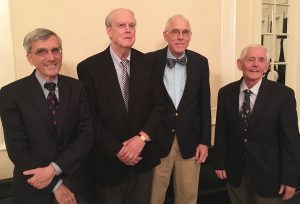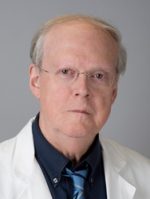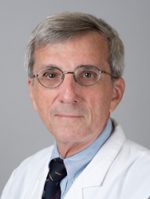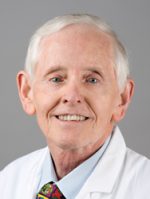Two members of the Department of Neurology, Drs. Tennison and Mann, have officially retired from the Department, but will continue their work at UNC on a part-time basis. Two other faculty members, Drs. Powers and Greenwood, recently started a three-year phased retirement and will also begin working part-time.

 Dr. Mann received his undergraduate bachelor’s degree from Amherst College in 1965 and his medical degree from Cornell in 1969. After completing a residency in neurology and a fellowship in neurochemisty at the University of Virginia he joined the UNC faculty in 1976, beginning a career in academic medicine spanning 42 years.
Dr. Mann received his undergraduate bachelor’s degree from Amherst College in 1965 and his medical degree from Cornell in 1969. After completing a residency in neurology and a fellowship in neurochemisty at the University of Virginia he joined the UNC faculty in 1976, beginning a career in academic medicine spanning 42 years.
Dr. Mann has received many awards for outstanding teaching and clinical care throughout his years at UNC with particular emphases on brain chemistry, chronic pain and complementary medical practice. He has received major funding for his research which most recently has included the impact of dietary alterations in essential fatty acids on pain characteristics in subjects with chronic headache.
His collaborative efforts in research have been extensive including faculty from numerous UNC departments. Additionally, he served as an IRB Chair in Medicine for 9 years and has been Co-Director of an NIH T-32 research fellowship in complementary and alternative medicine for the past 12 years. He counts his time as fellowship co-director and the ongoing research in fatty acids and chronic pain as his most significant contributions, both of which, he points out, have depended on extensive collaboration with many others.
Dr. Mann plans to continue his UNC research through consultation on new projects, analyzing results and writing papers.
 Dr. Tennison trained at UNC from 1978-81 and was then in private practice for two years prior to returning to UNC and to join Robert Greenwood, MD. They were a division of two people for many years. Dr. Tennison was the director of the clinical neurophysiology laboratory until entering phased retirement.
Dr. Tennison trained at UNC from 1978-81 and was then in private practice for two years prior to returning to UNC and to join Robert Greenwood, MD. They were a division of two people for many years. Dr. Tennison was the director of the clinical neurophysiology laboratory until entering phased retirement.
Dr. Tennison has always been active in the clinic caring for children with neurological disorders. Although he has had a focus on epilepsy, he has also been a generalist, fascinated by all aspects of child neurology.
In addition to treating thousands of patients since his arrival 40 years ago, Dr. Tennison sees the training of the residents as one of his greatest accomplishments. He has watched the Department grow substantially over the years and recognizes the need to grow even further to advance the health of children with neurological disorders. Dr. Tennison will continue to work for the Department part-time assisting with CNP services and teaching. He also plans to spend more time enjoying cycling, photography and travel.
 Dr. Powers, entered the three-year phased retirement program and stepped down as Chair of the Department of Neurology on April 30. Dr. Powers was recruited to UNC from Washington University School of Medicine in 2007 to chair the Department. He received his MD from Cornell University and was an intern at Duke University before completing his residency at the University of California, San Francisco.
Dr. Powers, entered the three-year phased retirement program and stepped down as Chair of the Department of Neurology on April 30. Dr. Powers was recruited to UNC from Washington University School of Medicine in 2007 to chair the Department. He received his MD from Cornell University and was an intern at Duke University before completing his residency at the University of California, San Francisco.
During phased retirement, Powers will continue as attending neurologist in the Neurology inpatient services and participate in the educational programs of the Department.
“It has been my privilege to lead this Department for the last 11 years,” Powers said. “We have accomplished a great deal working together and I look forward to watching the Department continue to grow and prosper.”
Powers has presided over significant clinical and research advancement during his time as Chair, including the opening of the 16-bed Neurosciences Intensive Care Unit in 2010 and the opening of UNC’s first Epilepsy Monitoring Units.
UNC Hospitals has also become a nationally recognized leader in stroke care. In 2013 and again in 2017, UNC was recognized by The Joint Commission and the American Heart Association/American Stroke Association with the Disease-Specific Care Comprehensive Stroke Center Certification. When first awarded in 2013, UNC was the 15th hospital in the nation, and first in the Southeast to achieve the designation. Further accolades were achieved in 2017 when UNC received the Gold Plus Award from the American Heart Association/American Stroke Association.
During Powers’ time as Chair, the Adult Neurology Residency Program was expanded from four to seven residents, the Child Neurology Residency was expanded from three to five years, and the number of accredited subspecialty residency programs expanded from one to six.
Throughout his time at UNC, Powers has maintained an active educational role, clinical practice and research portfolio. He has served as principal or co-investigator on 7 NIH research grants, been first or co-author on 48 peer-reviewed publications, and serves on the editorial boards of Stroke and The Journal of Cerebral Blood Flow and Metabolism. He has been recognized by residents four times with the Colin Hall Award for Teaching Excellence.
Nationally, Powers received the American Heart Association/American Stroke Association William M. Feinberg Award for Clinical Excellence in Clinical Stroke, and twice chaired AHA/ASA writing groups charged with updating care guidelines for stroke patients.
“Dr. Powers’ leadership has helped to establish UNC as a national leader in stroke care and a great place to train,” said Wesley Burks, MD, Executive Dean of the UNC School of Medicine. “On behalf of the institution, we wish Bill the best as he transitions to this next phase of his career.”
 Dr. Greenwood completed a pediatric and neurology residency and a research fellowship in neurosurgery at Washington University School of Medicine in St. Louis and joined the Department of Neurology in 1977.
Dr. Greenwood completed a pediatric and neurology residency and a research fellowship in neurosurgery at Washington University School of Medicine in St. Louis and joined the Department of Neurology in 1977.
Dr. Greenwood’s accomplishments over the past 40 years are extensive. He served as the Child Neurology Division Chief and Child Neurology Program Director for 33 years and feels privileged to have trained many academic and practicing child neurologists through the Department’s ACGME residency program.
In addition to his leadership roles, Dr. Greenwood also has had many productive years in research ranging from bench epilepsy research to translational work in neurocutaneous disorders. He and his lab were the first to make several discoveries relating to neurofibromatosis type I. He has also participated in multiple studies of antiepileptic drugs that have led to improved treatment of children with epilepsy.
Dr. Greenwood helped to launch the first neurocutaneous disorder clinic at UNC and has served as the director or co-director for the last 30 years. The clinic is now a part of the Children’s Tumor Foundation Neurofibromatosis Network and serves the largest number of neurofibromatosis patients in the Southeast.
Moving forward, Dr. Greenwood will serve as a co-director of the UNC Neurofibromatosis Clinic where he will continue to study the developmental differences in afflicted children. The pediatric team also plans to expand the clinic’s activities and provide new cutting-edge treatments.
In addition, Dr. Greenwood will remain active in writing guidelines for child neurology care at the local level. He will also continue to advocate for coordinated care and the extension of Medicaid to the children of North Carolina with neurological problems.
